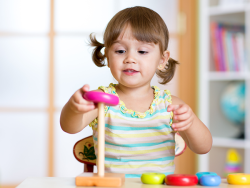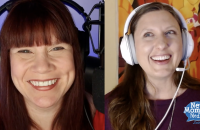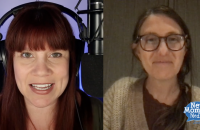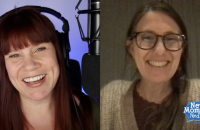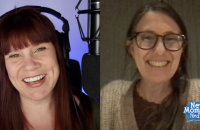Sunny Gault
If you've ever walked into a toy store, no doubt you've probably been overwhelmed, right? There's toys everywhere. But is all of that really necessary, especially if you're raising a Montessori baby. I'm Sunny with New Mommy Media and I'm here with Simone Davies. She is a best-selling author and Montessori educator, Simone, thanks so much for being with us today.
Simone Davies
Thank you so much. I'm looking forward to talking about what's three with you.
Sunny Gault
Yay. Well, speaking of Montessori, I have your book here, right, the Montessori baby. And in this book, you talk about babies not needing that much. And I think this is this trap that we fall into as parents, right? We're like, Oh, we've got a baby, we need, you know, baby needs all this kind of stuff. Um, and we kind of walk into that trap, especially when we're going into those toy stores. Right? There's stuff all over the place. So what is the Montessori approach to toys?
Simone Davies
Yeah, so it's definitely less is more. And I know, we all get sucked into it, because we're told that their brains grow so much in the first three years, you know, it's 80%. And so then I need to learn faster, and if my neighbors doing that with their child, and I need to do it, too. And the Montessori approach is to relax, that every child is developing at their own natural pace in a unique way. And so the best thing you can do is to observe your child, and to see what skills they're mastering right now. So if they're under three months old, they're probably focusing on visual development, and auditory development. So they're really simple things, three to six-month-olds developing hand skills, so they like working a lot on fine motor skills, and also gross motor skills. If you put them on a mat, they're stretching, rolling, discovering their bodies, and then six to 12 is a lot of gross motor movement, where they'll start slithering and crawling and pulling up, and then eventually, maybe beginning to walk. So you don't need that many toys, just simple things that are actually more passive, so that the baby's active baby toy that's got lots of flashing lights and things like that, he's actually likely to just have the baby pressing the button, then that's all so the babies the passive one, and we want to have a passive toy, like a beautiful wooden rattle that the baby needs to shake, or a simple could be a mobile that the child has to grasp on. And then to make it make the sound, or they have to knock it with their hands. And they're like, Oh, I made it move. Let me try that again. You know?
Sunny Gault
Yeah, so we're not like just putting these toys in front of them. And you know, just I guess, giving them the answers. It's more about discovery. So they can take and it can be more simple things, because it's their job to kind of play around with and see what it can do. We're not giving them all the answers basically.
Simone Davies
Exactly. Because if you have a reticle, and you're standing there shaking it, that doesn't make any sense, right? But if you put it in the baby's hands, or just further away, so they actually realize they need to grasp it to make the sound. And then one day, they'll realize, Oh, I can pass it from this hand to this hand. And then you'll realize, oh, what other things can they hold on to if they're holding on to your finger, for example, you'd be like, Okay, this time to begin interested in grasping something, maybe you could find like, a silk tube that they could hold on to, or there's beautiful silver rattles that are really baby-friendly. But if you look at some things that we're trying to make babies hold, they're like unwieldy, they're not beautiful. And we'd rather go for natural materials, because babies are going to put everything in their mouth. And plastic just tastes like plastic, where it tastes different to metal that tastes different, you know, so think about the sensorial experiences your baby's experiencing, as well.
Sunny Gault
That's a really good point. Because I'm thinking, you know, with plastic, from a mom's point of view, you're thinking, well, that's easy to clean off and whatever, you know, something gets on wood, you know, what do you do? It soaks through the wood, but I never really thought about the different textures and stuff that the baby is experiencing. So that's a really good point.
Simone Davies
Yeah, they're just rich experiences. They're sensorial learners. So they're learning everything from touching, feeling, smelling, and to make that as rich as possible in their first year.
Sunny Gault
Awesome. All right. Well, thank you, Simone. Of course, I showed you guys the book. Let's show it again. This is the book The Montessori baby. If you want to check it out, it's on Amazon or your local bookstores. You can also head on over to our website. It's newmommymedia.com. We've got lots of podcasts, videos over there. It's where real moms talk about real life.

